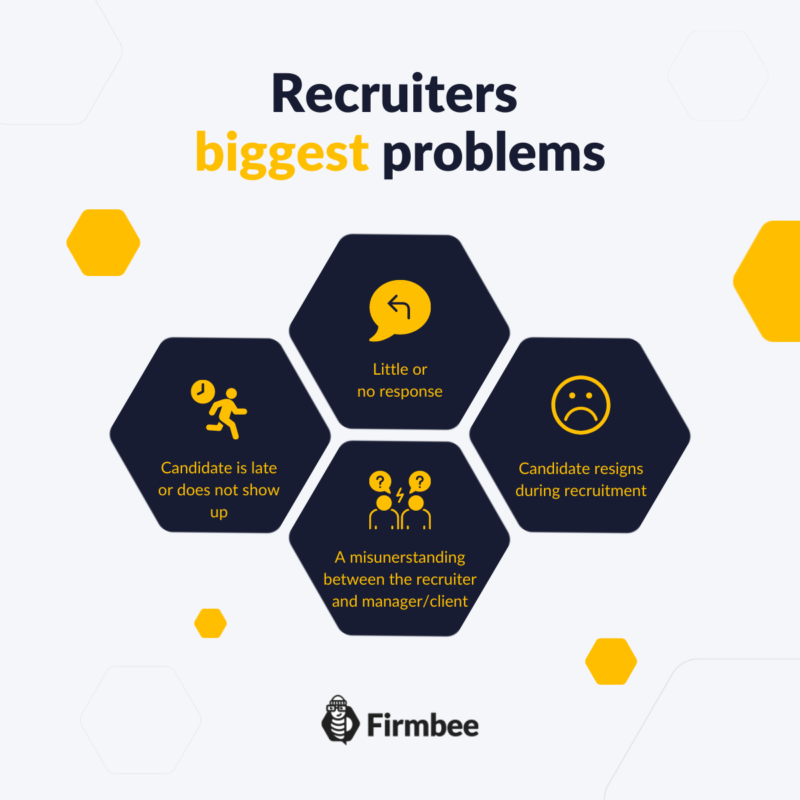What HR problems do recruiters face in their daily work? Learn the 4 biggest problems recruiters face and discover tips on how to deal with them.
HR problems – table of contents:
- Little or no response
- The candidate is late or does not show up for the interview
- The candidate resigns during recruitment
- A misunderstanding between the recruiter and the manager or client
- Are you keen on HR? Check out HR know-how by Firmbee
1. Little or no response
One of the main HR problems of recruiters is the low number of applications or even lack of them. The reason for this may be an unattractive offer, i.e. too low financial spreads, poor location of the company, unattractive ad, lack of detailed information in the offer or inadequate choice of channels for reaching potential candidates.
The reason for this may also be simply the lack of professionals who meet the requirements, caused by emigration and closing vocational schools, or other local factors. While the recruiter has no influence on the financial envelope or the location of the company, he/she can take care of refining the ad – to make it sound attractive and legible.
Try to emphasize the strengths of the offer, put in the ad extra information such as the possibility of remote working, offered benefits, or facilities located in the office. The length of the ad should be optimal – so that it contains all that is relevant from the point of view of the candidate, and at the same is concise in a way that encourages to read and apply. It’s also a good idea to regularly review competitors’ job postings – so you know what to expect in the current job market.
A good solution to the problem of lack of recruitment applications may beA good solution to the HR problems associated with a lack of recruitment applications may be to create an own database of candidates, saving the CVs of candidates for future recruitment. A good ATS (Applicant Tracking System) can help with this.
The recruiter should also be very well acquainted with job portals, to know where to place advertisements addressed to, for example, programmers or marketers. Also, to use other channels when looking for qualified professionals, others when recruiting blue-collar workers.
2. The candidate is late or does not show up for the interview
A significant problem is candidates being late and not showing up for scheduled interviews. While being late can often be justified by simple difficulties in finding the company’s headquarters or traffic jams, not showing up for an interview can be caused by fear of the interview, a fortuitous situation, receiving another, more favorable job offer, or simply a lack of personal culture.
It may also be a situation beyond the candidate’s control – he/she may have received a wrong address or may have mixed up the days or times of the appointment, or may not have had contact with the recruiter to inform about absence or tardiness.
In order to avoid such situations, a recruiter should take care of a few things at the stage of initial contact and set a recruitment meeting. Such a meeting should be arranged as soon as possible – waiting two weeks for the date of the meeting gives the candidate plenty of time to make up his mind. During this time the candidate may also receive another, better job offer and simply cancel the meeting.
To avoid miscommunication, after the phone call and appointment, it is a good idea to send the candidate a confirmation email with the address and time of the meeting. You can include directions to the meeting place, e.g. floor number, or a characteristic place nearby that the candidate can easily find.
Such an email should also include the recruiter’s contact name and phone number so that the candidate can inform the recruiter about canceling the recruitment or call the recruiter in case of a problem with getting through.
You can also include a request to be informed if you are going to be late or want to cancel the meeting. Many people are unaware that a recruiter not only spends time on the interview but also needs to prepare for it properly.
Such a request may simply remind someone to respect the recruiter and their time. A day before the interview (or on the day of the interview) it is a good idea to send an SMS reminding about the time and place of the meeting and asking for the candidate’s confirmation.
If, however, it happens that a promising candidate, despite confirmations, does not come to the interview, it is worth giving him/her a second chance. It is enough to write a message reminding that an interview was to take place on that day and asking if everything is alright.
If the employees show that they care and have an explanation for their absence, you can arrange a meeting at another time. Such an attitude builds a positive image of the company and good relations with candidates.
3. The candidate resigns during recruitment
Another problem recruiters have is when a candidate resigns during the hiring process – after an interview or recruiting assignment.
The reason may be financial expectations, a different idea of the position and the scope of responsibilities. Therefore, it is worth including detailed information in the ad – the exact scope of responsibilities, financial spreads – so that the candidates know what they are signing up for and there is less chance to resign for these reasons. Other reasons may include receiving another, more attractive job offer or the candidate’s personal situation.
In such a case, the only thing you can do is to contact the candidate, ask directly about the reason for resignation, ask for feedback about the recruitment process. This way you will know if you can improve something in the recruitment process and how to build an attractive workplace.
4. A misunderstanding between the recruiter and the manager or client
The last problem concerns relationships and communication in the company, particularly misunderstandings between the recruiter and the manager regarding the requirements for the future employee.
Misunderstandings can lead to incorrect information given to a candidate about salary, responsibilities, required skills or languages. The result of differences between the offer and the actual job may be that the new employee quickly resigns and the entire hiring process is redone.
To avoid such situations, you should maintain good relations with managers. It is worth setting common expectations with them and preparing a detailed job description even before the offer is published. Reliability at this stage will allow you to avoid later disappointment.

Are you keen on HR? Check out HR know-how by Firmbee:
If you like our content and you want to stay in touch – join our busy bees’ community!
Author: Nicole Mankin
HR manager with an excellent ability to build a positive atmosphere and create a valuable environment for employees. She loves to see the potential of talented people and mobilize them to develop.
The most important questions
-
Why does a candidate drop out during the recruitment process?
Reasons could be financial expectations, a different idea of the position, receiving a more attractive offer in the meantime, or a personal/chance situation.
-
Why didn’t anyone apply for the job offer?
The reason may be unattractive or incomplete offer – lack of details about the scope of responsibilities or salary, negative opinions about the employer or inadequate choice of channels to reach the candidates.


















